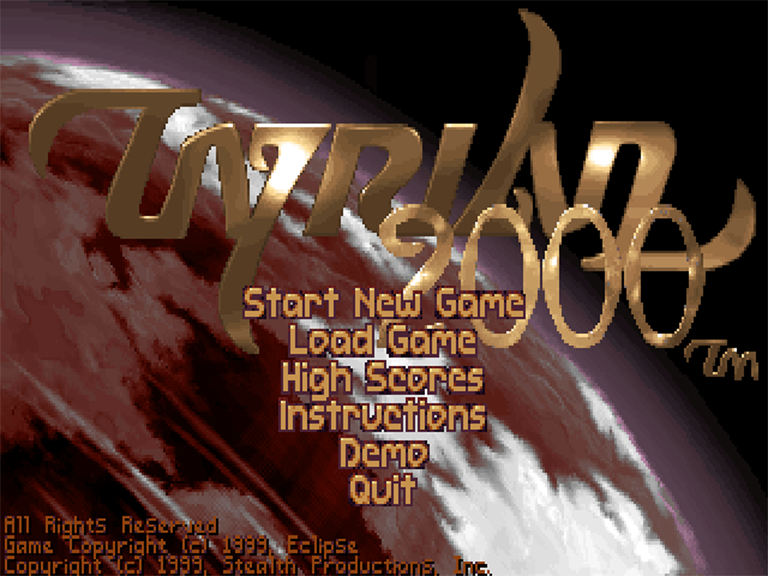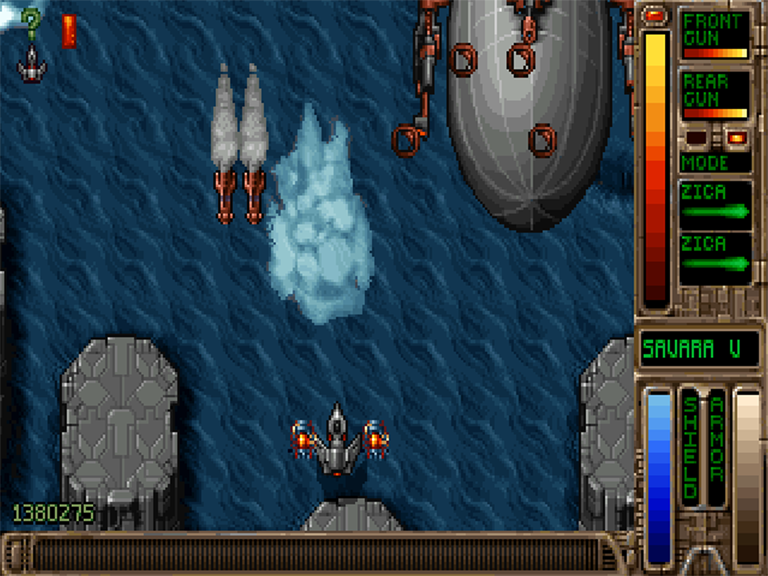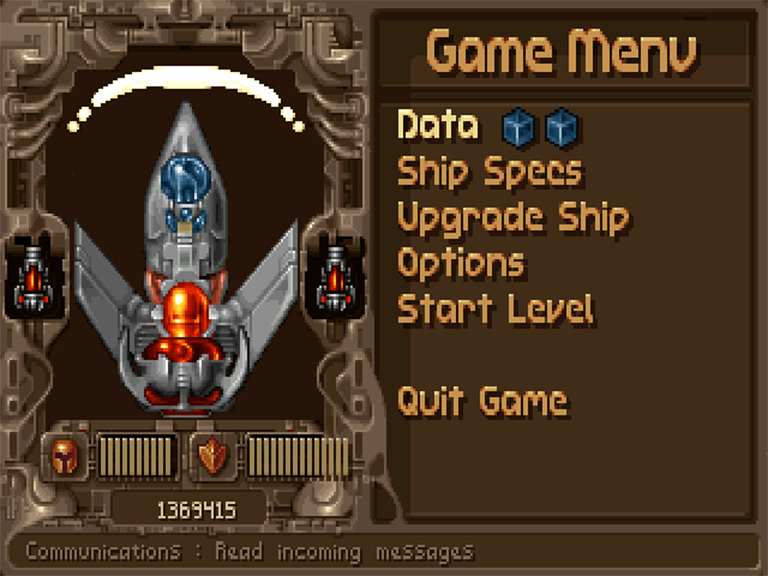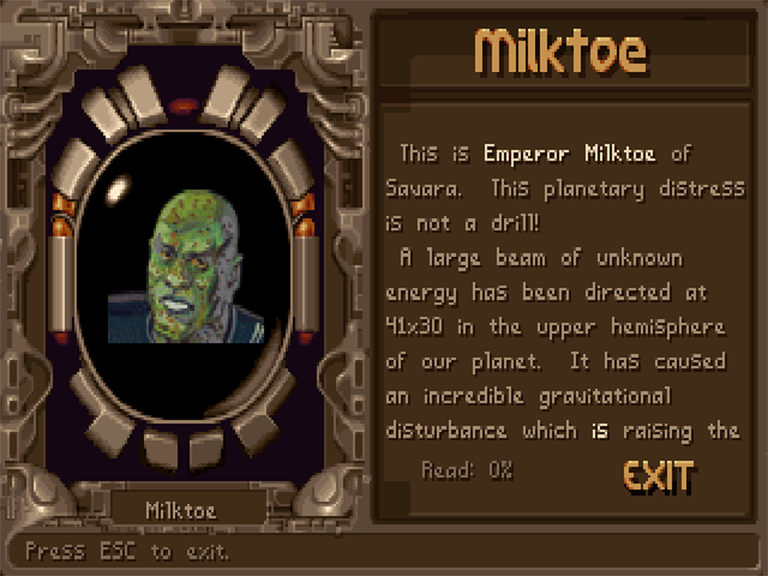Great things often come from small beginnings and such was the case with my favorite schmup (and possibly game, period) of all time, Tyrian 2000. In a tale straight out of the 90s, a guy (Jason Emery) showed his friend (Alexander Brandon) a scrolling background he'd made and they decided it was good enough to build on.

Emery was a programmer, Brandon – a writer – and between the two of them they put together a shooter concept they thought might interest the shareware publishers of the time. Their proposal went out to Apogee (now 3D Realms, of Prey fame) and Epic Megagames (yes, that Epic – Unreal Engine Epic; Fortnite, Epic; that Epic used to sell shareware in the 90s and if you think that's funny, before they sold shareware, Epic Megagames used to be Potomac Computer Systems: a single guy running a "consultancy" out of his parents' house; talk about great things from small beginnings).
As their proposal had no sound and (in their own words) "definitely not professional" graphics, neither of the big publishers bit, but both could see promise in what Emery and Brandon put together. Eventually, word got around to Robert Allen, of Safari Software (which made Traffic Department 2192 – a game I still remember being fascinated by as a wee piglet). Allen, thinking Tyrian was right up Safari's alley, got some proper talent involved and – with a staff of 11 – the game slowly started taking shape. When Epic saw the project with fully realized graphics and sound, they got on board as publisher and – four years after a guy showed a friend a scrolling background – Tyrian was released to general acclaim.
Even though chances are slight the same scenario could play out today – in the age of crowdfunding, focus-group feedback, tiered commitments and only doing enough work to fulfill The Letter of promised features (I am glaring at you, Harebrained Schemes; I have been glaring at you since 2018 and, yes, it does give me a headache, but it's unlikely I will ever stop) – I like to bring up Tyrian's origins because they show what kind of devs make Great Games.
Emery and Brandon weren't out to make a profit – they wanted to make a game. They had an idea they were passionate about and they kept at it until said idea was realized in accordance with their vision.
And that passion shows. Tyrian 2000 is so full of original ideas, in-joke nods, secret levels, special moves, minigames and extra features that it surpasses its own schmup conventions to form something wholly unique and ridiculosly entertaining. It's the one game my computer – through its many iterations – has never been without.

The core of the game is simple: you have a little ship, you fly upwards, shoot anything that moves and try not to die.

But your little ship has a generator, shields, hull, two guns (front and back, with back having two fire modes); space for two special weapons (which come in the form of companion ships, missiles, bombs, or detachable nose-cannon you can propel across the screen); and a slot for a super-power (of which my favorite is the SDF Main Gun: a beam wider than your ship that wipes out anything unfortunate enough to be in front of you).
Your little ship has special moves (key combinations, reminiscent of those in a fighting game, that cause a unique effect such as a blast of shurikens, rapid-fire gatling gun attack or regenerating your hull). Your little ship collects credits which you can spend in between levels on upgrades, equipment or even different little ships (each of which has its own move set).

The game has a fully-realized plot. Not one that takes itself too seriously (hard to do in a game that lets you fly a carrot that shoots hot-dogs), but one that is coherent and, at times, hilarious. The levels have a branching structure that let you access secret areas (which may offer special weapons or unique ships for sale); or choose which path you take to your destination. During levels, you can also pick up info cubes to gain more insight into what's going on at a given point in the plot.
Honeslty, Tyrian is so full of content that listing it all would make modern triple-A titles blush. And while its graphics and sound may be a little dated, the gameplay and sheer fun eclipses the poor excuses for "passion projects" that we see today.
If you like schmups or games that come with "a little something extra", Tyrian 2000 is in a league of its own. 27 years post-release, it remains my favorite schmup of all time and the proper way to do a casual game you can play for an hour, save progress, and shelve until you feel like having another go.
Pig Recommends:
-
Ring Runner: Flight of the Sages – proof that lightning can strike twice in the same genre, what Ring Runner lacks in graphics, it more than makes up in gameplay, content, writing and sound; a great little game made by a team of three, it comes with an interesting plot, unique mechanics, and a stable of 65 (!) fully customizable ships you get to fly around a quirky universe on a quest that mashes Jedi mysticism with Cowboy Bebop's "Americana in space" vibes;
-
One Must Fall 2097 - another great example of genre overlap, OMF is fun a 2D fighting game with RPG-lite stats (you get to increase your character's strength, agility and endurance), secret moves, secret oponents, unique power-ups, stage hazards and – yes – a plot; it even pays homage to Mortal Kombat's fatalities — only with giant robots (ergo entirely guilt-free when something breaks, shatters or explodes);
